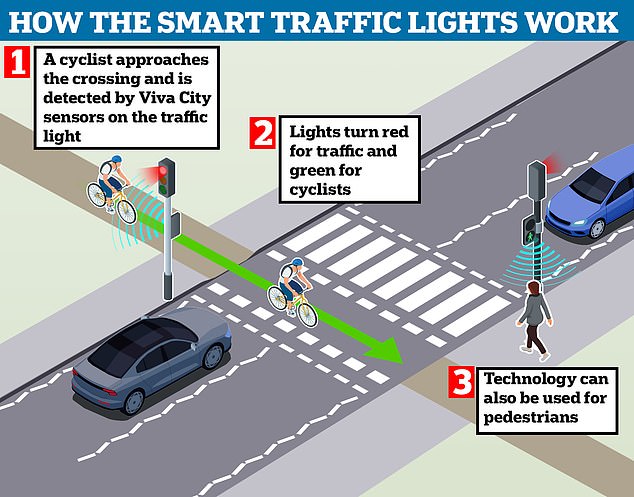Imagine a future where cyclists can cruise through city streets without constant stops at traffic lights.
This vision is becoming a reality in Birmingham, where new traffic lights are giving bike riders the green light—literally.
The latest innovation involves traffic lights that prioritize cyclists over cars, making their journeys smoother and more uninterrupted.
How the New System Works
These cutting-edge traffic lights, installed on A34 Stratford Road near Blythe Valley, Birmingham, use sensors to detect cyclists from up to 30 meters away.
When a cyclist approaches, the lights turn red, allowing them to cross safely.
This system, known as a toucan crossing, also accommodates pedestrians.
Developed by VivaCity, these sensors are designed to encourage more people to use bikes and promote active travel, signaling a shift in focus from cars to cyclists.
Benefits and Future Plans
The sensors aim to reduce collision risks and waiting times at crossings by detecting cyclists earlier.
This pilot project is expected to pave the way for similar initiatives across the West Midlands, promoting reduced vehicle dependency.
Mark Nicholson, CEO of VivaCity, emphasized that AI can analyze traffic patterns without using personal data, allowing for tailored traffic management.
For instance, algorithms can prioritize cyclists or pedestrians during peak times, such as when children are heading home from school.
Government and Local Reactions
Transport Secretary Louise Haigh announced plans for substantial investment in active travel to alleviate NHS pressures.
However, not everyone is on board; shadow transport secretary Helen Whately criticized Labour’s approach to transport policy.
Meanwhile, Richard Parker, Mayor of the West Midlands, praised the project as a step toward safer roads and improved cycling conditions, which he believes will enhance fitness, reduce traffic jams, and improve air quality.
Local Support for the Initiative
Solihull Council’s Cllr Ken Hawkins expressed support for the new sensors, highlighting their potential to make the Monkspath to Blythe Valley route a more appealing option for cyclists.
Peter Mildon, COO of VivaCity, is excited about the role of their technology in advancing road safety and looks forward to further collaborations with Transport for West Midlands.
Upcoming AI Speed Cameras
In addition to these cyclist-friendly traffic lights, the UK is rolling out AI speed cameras that can detect drivers using mobile phones or not wearing seatbelts.
This technology will help enforce road safety regulations more effectively.
However, privacy advocates are concerned about the intrusive nature of these cameras, which can capture detailed images of drivers.
Addressing Privacy Concerns
These new AI cameras take two images of each vehicle—one to check for phone use and another to detect if a seatbelt is being worn.
AI then analyzes these images to identify violations, with evidence sent to police for prosecution.
To address privacy issues, the images are anonymized, removing identifiable features like number plates before any legal action is taken.
What’s Next?
As these technologies continue to evolve, the focus remains on balancing road safety with privacy concerns.
The advancements in traffic management and enforcement are setting new standards for safer and more efficient travel, both for cyclists and drivers alike.
Mine Crypto. Earn $GOATS while it is free! Click Here!!
